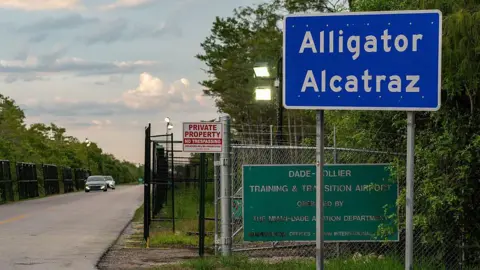When her son was taken into immigration custody, Yaneisy Fernandez feared the worst. Then she got a call from him inside Alligator Alcatraz.
We had no idea where he was until he called us, Yaneisy told the BBC. He said, 'mom, they took me to the facility of the crocodiles.' That's how he put it.
The temporary immigration detention centre built in Florida's Everglades has quickly become a polarising symbol of President Donald Trump's immigration policy. Now, just two months after it opened, the Department of Homeland Security (DHS) has said it will be shutting it down, in compliance with a judge's orders. The process is already under way - border tsar Tom Homan told the BBC during a press conference that only about 50% of the detainees remain.
Families of inmates describe harrowing experiences, claiming that the facility has subjected them to neglect and brutal conditions. Yaneisy's son, Michael Borrego Fernandez, claims to have been left bleeding after a severe medical incident, adding that inmates were denied access to legal counsel.
Dubbed Alligator Alcatraz, the facility housed around 3,000 detainees and became a flashpoint in the debate over immigration laws. While some praised efforts to enforce stricter measures, critics condemned its operations as harsh and inhumane.
The closure of 'Alligator Alcatraz' comes amidst ongoing lawsuits aimed at immigration practices, highlighting the discontent with how detainees are treated medically and legally. As families continue to experience distressing separations and medical emergencies inside the facility, the push for reform in U.S. immigration practices becomes ever more urgent.
As the facility prepares for its shutdown, the fate of other immigration centers remains uncertain, with ongoing discussions about future policies and facility designs across the United States.






















